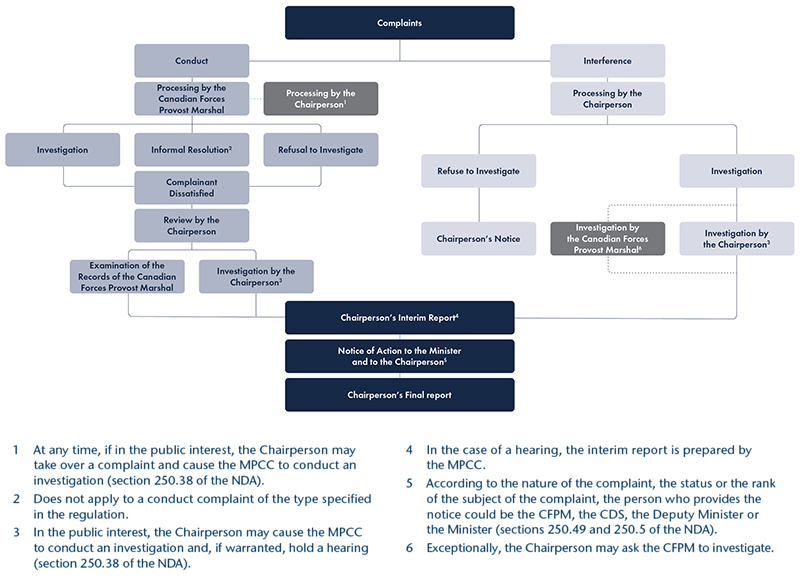2022 Annual Report | Charting Oversight in a New Era
____________________________
The Honourable Anita Anand
Minister of National Defence
His Majesty the King in Right of Canada, represented by the Military Police Complaints Commission of Canada, 2023.
Catalogue No. DP1E‑PDF | ISSN 1910‑8230
Table of Contents
- Interim Chairperson's Message
- Part 1 – Overview
- Follow-up to Third Independent Review of the National Defence Act
- Part 2 – The Year in Review
- Monitoring and Investigations
- Public Interest Investigation (MPCC 2022-017/-041/-043)
- Registrar Public Interest Investigation
- Public Interest Investigation into Military Police Unit's Handling of an Investigation Involving one of its Members
- Impact on Military Policing – Case Summaries
- Outreach
- Collaboration
- Part 3 – Excellence in Management and Leadership
- Part 4 – Conclusion
Letter of Transmission to the Minister
March 31, 2023
The Honourable Anita Anand, P.C., M.P.
Minister of National Defence
National Defence Headquarters
Major-General George R. Pearkes Building
Ottawa, Ontario K1A 0K2
Dear Minister:
In accordance with subsection 250.17(1) of the National Defence Act, I submit the annual report of the Military Police Complaints Commission of Canada for the 2022 reporting period for tabling in Parliament.
In this annual report, you will find a discussion of significant aspects of the Military Police Complaints Commission of Canada's activities during 2022, including summaries of some of its reviews and investigations of complaints.
Yours truly,
Original signed by
_________________________________
Me Tammy Tremblay, MSM, CD, LL.M.
Chairperson
Interim Chairperson's Message

In 2022, the Military Police Complaints Commission of Canada (MPCC) continued to meet the challenges of an increased workload and ongoing issues related to the COVID‑19 pandemic. The MPCC has continued to be able to rely on the professionalism of its small but dedicated staff who remain committed to excellence in the fulfillment of our mandate in the service of Canadians. But the year 2022 was also a year of dramatic transition. The MPCC has had to chart a new era of oversight for a changed environment.
The passing of the late Queen, and ascension of the new King, marked the start of a new era for all Canadians and citizens of the Commonwealth. The late Queen's example of dedication to public service has been an example to us all.
Closer to home, the nomination of a new Chairperson, the MPCC's fifth, marks a new era at the Commission. The incumbency of a new Chairperson has always been a time of renewal and rededication for the MPCC. I know that the MPCC and our mandate will be in capable hands with Me Tammy Tremblay.
The year 2022 also marked the beginning of a new era in military policing, particularly in light of the reforms implemented as a result of the Independent External Comprehensive Review of the Department of National Defence and the Canadian Armed Forces, conducted by former Supreme Court of Canada Justice, Louise Arbour. These included the transfer of responsibility for most Military Police sexual assault investigations to civilian police services, and the extension of the authority to lay charges under the Code of Service Discipline to all Military Police. Until now, charge-laying authority for service offences was exercisable only by the chain of command and members of the Canadian Forces National Investigation Service. This new authority represents the most significant change to Military Police jurisdiction since members of the Military Police were made peace officers under the Criminal Code in 1972.
This past year also marked a new emphasis in military policing on the rights and interests of victims in the military justice system. In 2022, Bill C-77 came into force adding the Declaration of Victims' Rights to the National Defence Act's Code of Service Discipline, providing clear statutory rights to victims of service offences regarding information, protection, participation and restitution in the military justice system. The Declaration is modelled on the 2015 Canadian Victims Bill of Rights, applicable to the civilian criminal justice system.
Since the nature and content of complaints dealt with by the MPCC evolve with the military policing environment, these reforms to military policing will undoubtedly affect the work of the MPCC. Hence the need to navigate military policing oversight in a new era.
The MPCC has been actively engaged with these reforms by participating in Working Groups with the offices of the Canadian Forces Provost Marshal and the Judge Advocate General, on the implementation of the recommendations of the Third Independent Review of the National Defence Act.
This Independent Review was completed in 2021 and made a number of critical recommendations aimed at strengthening the MPCC's access to information necessary to fulfill its mandate. The Working Groups made considerable progress in the first half of 2022; however, the pace of activity has dropped off notably since that time. Given the importance of these legislative changes to the effectiveness of Military Police oversight, we hope that meaningful progress will resume as soon as possible.
The MPCC has been actively charting a new era of oversight in other ways as well. Transition and renewal were very much key themes for the MPCC in 2022.
The MPCC has continued to explore and implement ways to enhance the timeliness of its treatment of complaints as well as the accessibility of its services to the public. The MPCC's internal procedures for dealing with complaints continue to be refined and flexibility and creative solutions are encouraged at all stages.
Equity, accessibility, and diversity continue to be core values of the MPCC. In 2022, the MPCC established an Accessibility Plan which aims to ensure an environment free of barriers to persons with disabilities in all areas of its operation. The MPCC also sought to diversify its pool of contract investigators to better reflect the diversity of Canadians.
The year 2022 saw the inauguration of the MPCC's new Hybrid Work Model, as part of the government's initiative to change the face of government and how we do business. The MPCC took a proactive approach by leading engagement sessions with staff prior to its implementation in the Fall of 2022. This Work Model seeks to harness the best elements of the office environment with the advantages of teleworking.
In the past year, the MPCC continued with its ambitious program of outreach to better educate and engage with stakeholders of military policing and the complaints process. In addition to its customary presentations to groups of Military Police, unit command teams and Military Family Resource Centers, there were special presentations to the Australian Royal Commission into Defence and veteran suicides, the Canadian Forces National Investigation Service and the office of the Chief of the Defence Staff.
On the operational side, 2022 saw the completion of a significant MPCC public interest investigation and the initiation of another. Both of these cases are discussed in greater detail elsewhere in this Annual Report.
The Registrar Public Interest Investigation, launched in October 2020, was completed with the issuance of the MPCC's Final Report in March 2022. This case – which marked the first time that the MPCC itself had initiated a complaint – addressed the Military Police response to an allegation of criminal harassment involving two Royal Military College cadets, and the failure to properly respond to signs of mental illness on the part of one of the cadets. The MPCC made several important recommendations, all of which were accepted by the Canadian Forces Provost Marshal.
In November 2022, I initiated a new Public Interest Investigation. This Public Interest Investigation relates to three separate complaints received by the MPCC regarding the Military Police handling of a sexual assault investigation. The complaints relate to the conduct of the investigation by members of the Canadian Forces National Investigation Service, as well as the initial intake of the criminal complaint by the local Military Police Detachment.
2022 has indeed been an active and productive year for the MPCC. I would like to take this opportunity to thank the staff and Commission Members of the MPCC for their work and dedication, and the office of the Canadian Forces Provost Marshal, for their professionalism and collaboration. Charting oversight in a new era is indeed a collective endeavor.
I hope you will find this Annual Report to be helpful and informative.
Original signed by
_____________________________
Bonita Thornton, B.A., LL.B., CD
Interim Chairperson
Part 1 – Overview
I – Military Police Complaints Commission of Canada
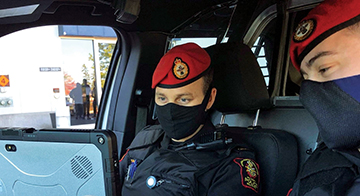
The Military Police Complaints Commission of Canada (MPCC) was established on December 1, 1999, by the Government of Canada to provide independent civilian oversight of the Canadian Forces Military Police. This was achieved through an amendment to the National Defence Act creating a new Part IV, which sets out the mandate of the MPCC and how complaints about military policing are to be handled. As stated in Issue Paper No. 8, which accompanied the Bill that created the MPCC, its role is "… to provide for greater public accountability by the Military Police and the chain of command in relation to military police investigations."
You will find more information about the MPCC, its mandate, mission and the Military Police on our website:
II – The Complaint Process
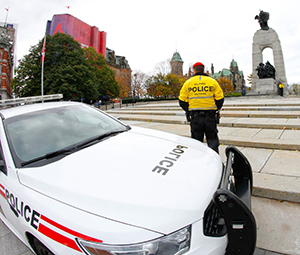
The MPCC has exclusive responsibility to examine interference complaints. Conduct complaints are dealt with by the Canadian Forces Provost Marshal in the first instance during which time the MPCC is responsible for monitoring them. Any complainant not satisfied with the Canadian Forces Provost Marshal's disposition of a conduct complaint, can ask the MPCC to review their complaint and its initial investigation or other disposition. In addition, the MPCC's Chairperson may, at any time, initiate a Public Interest Investigation or Hearing of either a conduct complaint or an interference complaint. The illustration on the following page sets out the steps in the complaints processes. In addition, more information on our complaint process is on our website under the following sections:
Alternate format
The image illustrates the Military Policy Complaints Commission of Canada's (MPCC) complaints process which explains the two processes, namely the conduct complaint and the interference complaint.
- Conduct Complaint
- Processing by the CFPM
- Investigation
- Complainant Dissatisfied
- Informal Resolution (eligible complaints are less serious and are set out by Regulations)
- Refusal to Investigate
- Complainant Dissatisfied
- Investigation
- Processing by the Chairperson (at any time, if in the public interest, the Chairperson may take over a complaint and cause the MPCC to conduct an investigation (section 250.38 of the NDA))
- Complainant Dissatisfied
- Review by Chairperson
- Examination of the records of the CFPM
- Investigation by the Chairperson (in the public interest, the Chairperson may cause the Complaints Commission to conduct an investigation and, if warranted, hold a hearing (section 250.38 of the NDA))
- Review by Chairperson
- Chairperson's Interim Report (in the case of a hearing, the interim report is prepared by the MPCC)
- Notice of Action to the Minister and to the Chairperson (according to the nature of the complaint, the status or the rank of the subject of the complaint, the person who provides the notice could be the CFPM, the Chief of the Defence Staff, the Deputy Minister or the Minister (sections 250.49 and 250.5 of the NDA))
- Chairperson's Final Report
- Processing by the CFPM
- Interference Complaint
- Processing by the Chairperson (at any time, if in the public interest, the Chairperson may take over a complaint and cause the MPCC to conduct an investigation (section 250.38 of the NDA))
- Refusal to investigate
- Chairperson's Notice
- Investigation
- Investigation by the CFPM (exceptionally, the Chairperson may ask the CFPM to investigate)
- Investigation by the Chairperson (in the public interest, the Chairperson may cause the Complaints Commission to conduct an investigation and, if warranted, hold a hearing (section 250.38 of the NDA))
- Refusal to investigate
- Chairperson's Interim Report (in the case of a hearing, the interim report is prepared by the MPCC)
- Notice of Action to the Minister and to the Chairperson (according to the nature of the complaint, the status or the rank of the subject of the complaint, the person who provides the notice could be the CFPM, the Chief of the Defence Staff, the Deputy Minister or the Minister (sections 250.49 and 250.5 of the NDA))
- Chairperson's Final Report
- Processing by the Chairperson (at any time, if in the public interest, the Chairperson may take over a complaint and cause the MPCC to conduct an investigation (section 250.38 of the NDA))
Follow-up to Third Independent Review of the National Defence Act
The Third (and most recent) Independent Review of the 1998 National Defence Act amendments was conducted between November 5, 2020, and April 30, 2021, by former Supreme Court of Canada Justice Morris Fish. The Report of the Third Independent Review Authority dated April 30, 2021, was tabled in Parliament by the Minister of National Defence on June 1, 2021. The Minister of National Defence indicated that the Independent Review recommendations were accepted in principle by the Government.
As with the two previous reviews, the MPCC participated fully in the review process and submitted extensive proposals for legislative change (24 items in total) intended to improve the effectiveness and fairness of the military police complaints process, and to enhance the independence of the Military Police from potential interference by the senior leadership of the Canadian Armed Forces or the Department of National Defence. The MPCC also provided background briefings and answered various queries from the Third Independent Review Authority.
The major thrust of the MPCC's submissions was to enhance its ability to access information required to fulfill its mandate. Too much of the MPCC's ability to access information relevant to its mandate is dependent on the voluntary cooperation from the Canadian Forces Provost Marshal and the Department of National Defence. Reliance on voluntary cooperation is contrary to basic principles of independent oversight and it can undermine confidence in the MPCC which, in turn, weakens public confidence in the Military Police.
In general, the MPCC's key proposals in the area of its access to information were either definitively endorsed by the Independent Review Authority or were recommended for further discussion between the MPCC and relevant stakeholders. Even in the areas where further discussion and consultation were recommended by the Independent Review Authority, the latter accepted key tenets of the MPCC's position on the issue.
Since July 2021, the MPCC has met regularly in Working Groups comprised primarily of representatives of the MPCC, the Canadian Forces Provost Marshal and the Office of the Judge Advocate General. Representatives of other offices, like the Department of Justice, have also been consulted as needed. The goal of the Working Groups has been to reach agreement on how best to implement the definitive recommendations of the Independent Review and, in those areas where the Independent Review recommended discussion, to advance that discussion toward a resolution.
In the first half of 2022, the Working Groups made considerable progress in discussions on the implementation of Independent Review recommendations affecting the MPCC and the National Defence Act Part IV complaints process. Moreover, in areas that are particularly contentious, issues in dispute have been narrowed considerably.
In the second half of 2022, however, Working Group activity has dropped off notably. Part of this may be the result of our earlier rapid progress which may now necessitate a pause while the External Comprehensive Reviews Implementation Committee (the Committee) is engaged and brought up to date on the progress of our Working Groups. The Committee is a top-level Department of National Defence-Canadian Armed Forces body established to coordinate the implementation of various external review recommendations, including the Third Independent Review of the National Defence Act (Fish Report) and the Independent External Comprehensive Review (Arbour Report).
The MPCC looks forward to resuming our collaboration with the Canadian Forces Provost Marshal, the Office of the Judge Advocate General and other departmental and government stakeholders in the improvement of the Military Police complaints system, including through the implementation of Justice Fish's report.
Part 2 – The Year in Review
I – Monitoring and Investigations
The following table highlights the MPCC statistics on a four-year comparative basis from 2019 to 2022. The table cannot fully reflect the complexity and scope of the types of complaints the MPCC handles, nor accurately predict when complex complaints will be referred. While there are standard procedures followed on each file, many follow unique paths considering the specific circumstances. For example, in the Registrar Public Interest Investigation file, the MPCC self-initiated a complaint for the first time, and the newest Public Interest Investigation comprises three separate complaints about a particular Military Police investigation. In the former, since the MPCC initiated the complaint, it took extra steps to ensure that key witnesses were kept apprised of the investigation. In the latter, the MPCC has been careful to keep the various parties of the separate cases informed.

| Statistics from 2019 to 2022 | 2019 | 2020 | 2021 | 2022 |
|---|---|---|---|---|
| Conduct Complaints Carried Over by the Office of Professional Standards1 | 37 | 28 | 38 | 65 |
| Interference Complaints Carried Over | 1 | 2 | 2 | 5 |
| Reviews Carried Over | 14 | 17 | 11 | 11 |
| Section 250.38 Public Interest Investigations/Hearings Carried Over | 2 | 2 | 3 | 6 |
| Judicial Proceedings Carried Over (e.g. Judicial Review) | 1 | 0 | 0 | 0 |
| Other External Proceedings Carried Over | 0 | 0 | 0 | 0 |
| Total Files Carried Over | 55 | 49 | 54 | 87 |
| General Files Opened (Request for Information and Other) | 51 | 93 | 126 | 86 |
| New Conduct Complaints (A) | 47 | 41 | 51 | 49 |
| New Interference Complaints (A) | 4 | 1 | 5 | 3 |
| New Reviews | 9 | 5 | 3 | 6 |
| New section 250.38 Public Interest Investigations/Hearings | 0 | 1 | 3 | 4 |
| New Judicial Proceedings (e.g. Judicial Review) | 0 | 0 | 0 | 1 |
| New Other External Proceedings | 0 | 0 | 0 | 0 |
| Total New Files Opened | 111 | 141 | 188 | 149 |
| Total Files under review in the Year | 166 |
190 | 242 | 236 |
| Public Interest Decisions/Rulings Issued | 2 | 2 | 3 | 10 |
| Time Extension Decisions Issued | 10 | 7 | 6 | 19 |
| Interim Reports Issued | 5 | 10 | 8 | 7 |
| Final Reports Issued (B) | 8 | 12 | 8 | 12 |
| Reports/Decisions/Rulings Issued | 25 | 31 | 25 | 48 |
| Recommendations on Final Reports | 5 | 10 | 26 | 32 |
| Percentage of Recommendations Accepted | 100% | 100% | 65%2 | 97% |
| Percentage of Recommendations Not Accepted | 0% | 0% | 23% | 0% |
| Percentage of Recommendations Outstanding | 0% | 0% | 12%3 | 3%4 |
II – Public Interest Investigation (MPCC 2022-017/-041/-043)
On November 21, 2022, the Interim Chairperson, Bonita Thornton, decided that the MPCC would conduct a joint Public Interest Investigation into three separate complaints concerning the actions of members of the Canadian Forces National Investigation Service as well as members of a Military Police Detachment located on a Canadian Forces Base. The complaints all relate to the Military Police handling of a sexual assault investigation.
More information will be released about this Public Interest Investigation in the future.
III – Registrar Public Interest Investigation
On October 20, 2020, former Chairperson Hilary McCormack decided that the MPCC would conduct a Public Interest Investigation into a complaint concerning the actions of the Military Police Kingston Detachment in relation to military police investigations involving Officer Cadets at the Royal Military College of Canada. This is the first Public Interest Investigation to be launched concerning a complaint initiated by the MPCC itself.
The public interest considerations present in this case included the systemic issues raised around suicide and the safety of complainants, the seriousness of the questions concerning the criminal harassment and sexual offences investigations, and the risk of potential negative perceptions that may have an impact on confidence in the Military Police or even discourage potential victims or complainants from coming forward.
This Public Interest Investigation related to the handling by Military Police of issues arising from the relationship between a male and female Officer-Cadet. The female Officer-Cadet came to the Military Police with concerns about the male Officer-Cadet's behaviour and about her safety. This Public Interest Investigation investigated whether Military Police members conducted a reasonable investigation in response to the female Officer-Cadet's allegation and evidence of criminal harassment, and responded appropriately to concerns of her safety.
This Public Interest Investigation also examined whether Military Police members responded appropriately to concerns about the male Officer-Cadet's mental health, and whether they acted appropriately in suggesting to the female Officer-Cadet that she might be investigated for, or charged with, a solicitation-related offence. Finally, the Public Interest Investigation probed whether there was adequate oversight and supervision in this case by superior Military Police members.
On September 29, 2021, the MPCC submitted its Interim Report setting out its findings and recommendations to the CFPM and to the Minister pursuant to section 250.39 of the National Defence Act. The MPCC issued its Final Report on March 22, 2022. In its Final Report, the MPCC made 15 recommendations that addressed a wide range of issues identified in its investigation, including the need to: review Military Police training at all levels in the areas of victims' rights and services; put in place a risk management strategy to help protect persons who may be in danger of harm; add training on criminal harassment to the curriculum of the Military Police Academy; and add training to enhance and facilitate the consultation with legal counsel by the Military Police. The MPCC also recommended the Canadian Forces Provost Marshal apologize on behalf of the Military Police to the female Officer Cadet and the family of the male Officer Cadet for the failures in the investigations related to the incidents that occurred between the two cadets. The MPCC is pleased to report that the Canadian Forces Provost Marshal accepted all the MPCC's findings and recommendations including one partially accepted recommendation. The MPCC is also satisfied with the Canadian Forces Provost Marshal's responses and actions taken to implement the MPCC's recommendations, most notably the issuance of the apology letters to the female and male Officer Cadets.
Further details on this Public Interest Investigation are available on the Registrar Public Interest Investigation homepage on our website.
IV – Public Interest Investigation into Military Police Unit's Handling of an Investigation Involving one of its Members
The MPCC continues its work in relation to a Public Interest Investigation into the handling of an investigation by a Military Police Unit into one of its own officers.
A Military Police officer, who appeared to be intoxicated, attempted to drive home with their children after leaving a restaurant. The officer put the children in the car, however, bystanders believing the officer to be intoxicated intervened and prevented the officer from getting in the car.
The local Police soon arrived on scene. When they learned that the person involved was a Military Police member, the local Military Police Unit was advised and one of their members attended the scene. The local Police elected to waive jurisdiction over the incident in favour of the Military Police members.
Members of the Military Police Unit soon became concerned over the way the case was allegedly handled by the unit commander and the sergeantmajor for the following reasons:
- Alterations were made to the Military Police investigator's electronic investigation report without the investigator's knowledge or agreement.
- The Military Police Unit commander and the sergeant-major repeatedly advised the investigator that charges would not be laid regarding the incident.
- Failure to report the incident to the Canadian Forces National Investigation Service who has jurisdiction to investigate offences by Military Police members.
- Failure to report the incident to the Office of Professional Standards of the Canadian Forces Provost Marshal.
- Subordinate Military Police Unit members were directed to not report the incident and threatened those who did so with reprimands and/or being posted to a Military Police Unit in another region of the country.
Based on these concerns, members of the Military Police Unit filed interference and conduct complaints with the MPCC in late April 2021.
A further related interference complaint was filed with the MPCC on July 15, 2021. This complaint alleges interference with a child welfare investigation which implicated the same Military Police officer who is the subject of the investigation of the original incident.
Given the seriousness of these complaints, and the desire to address them in a timely and coherent manner, former MPCC Chairperson Hilary McCormack decided on August 3, 2021, that the public interest would best be served by having the MPCC address them together and at the same time.
These complaints allege that the Military Police Unit's leadership attempted to cover up the alleged misconduct of a Military Police Officer of that Unit and improperly gave special treatment to the Military Police officer involved. It is also alleged in the complaint that details of this incident and the way it was handled by the Military Police Unit have become widely known within the local law enforcement community.
On January 7, 2022, the MPCC received a further related complaint from a third party also alleging that the Military Police Detachment leadership were "covering up" for the Military Police officer in their handling of the Military Police Officer's conduct issues. On March 23, 2022, this complaint was designated as a Public Interest Investigation and joined with the existing Public Interest Investigation regarding the three earlier complaints.
The allegations in these complaints go to the very core of police values and ethics. They have the potential to undermine public confidence in the Military Police and their adherence to basic precepts of the rule of law: namely, the principle of equality before the law.
The MPCC carried out interviews as part of its PII from January to March 2022. The MPCC has prepared its Investigation Assessment Reports on these complaints and is drafting its Interim Reports. These will set out the MPCC's findings and recommendations pursuant to section 250.39 of the National Defence Act.
Updates on the progress of the investigation will be posted on our website, under the header "Timeline".
V – Impact on Military Policing – Case Summaries
The section below summarizes selected conduct and interference cases completed by the MPCC in 2022.
i – Conduct Cases MPCC 2018‑14 and 2019‑007
The MPCC coordinated its investigations into these two conduct complaints as the underlying facts, Military Police members involved, and evidence overlapped. One conduct complaint was filed in April 2018 and the other in January 2019.
The complainants were members of a foreign navy's sports team that arrived in Canada to play in a tournament in April 2015. At the heart of the complaint is a sexual assault allegation against the complainants and two other members of the team that was investigated by the Canadian Forces National Investigation Service. The complainants were charged with sexual assault causing bodily harm and sexual assault with more than one person under the Criminal Code of Canada. A Preliminary Inquiry resulted in the complainants being committed to trial in September 2016. A decision from a Voir Dire hearing involving the complainants was released in September 2017 and included the conclusion that one complainant's right to counsel without delay had been violated. The Crown Prosecutors ultimately withdrew the charges.
The Office of Professional Standards of the Canadian Forces Provost Marshal investigated 28 allegations against 11 members of the Military Police. These included concerns about the arrest, language used by the Military Police, security, securing/suppressing evidence, documentation, failure to interview witnesses, and logistical issues. The Professional Standards investigation in 2018‑014 found all allegations were not substantiated except one which was partially substantiated. In 2019‑007, the Professional Standards investigation found 12 allegations were not substantiated, one allegation was partially substantiated, and one allegation was substantiated.
The complainants requested the MPCC to review their complaints in December 2019 and March 2020 respectively. The MPCC identified one additional subject Military Police member who was involved in the Canadian Forces National Investigation Service investigation in 2018‑014 and an additional three subjects in 2019‑007. The MPCC investigated 29 allegations overall. In 2018‑014, it determined two allegations partially substantiated and one substantiated. In 2019‑007, it determined that two allegations were partially substantiated and four substantiated. All other allegations were not substantiated.
The MPCC found that the search incident to arrest of the complainants took place within a reasonable time after the arrest, without excessive force and that there was no evidence that anyone other than the arresting Military Police members and the complainants witnessed the arrest. Military Police members are required to conduct a search incident to arrest at the location of the arrest and, as it was not a strip search, there was no requirement to conduct the search in private. One complainant was kept in handcuffs longer than required as there were no circumstances to justify continued restraint once the search was completed and he was placed in the back of the police vehicle. The MPCC did not find unprofessional conduct prior, during or after the interview of one complainant as there was no evidence of Military Police members making disparaging comments about legal counsel as alleged. As the MPCC found that one subject Military Police member did not make sufficient effort to locate a particular witness in order to serve a subpoena, it partially substantiated the related allegation. However, in this instance, the Military Police did successfully complete this service and the witness testified.
The MPCC found that the actions of the subject Military Police members did not demonstrate bias or a lack of independence from the military chain of command as alleged. The MPCC found no evidence that the military police failed to interview key witnesses thereby failing to conduct a thorough and complete investigation or that they suppressed evidence as was alleged by the complainants. The Military Police did, however, fail to interview an individual that was mentioned by the alleged victim during her statement, and also failed to inquire into the alleged victim's cellphone which may have contained evidence to support the prosecution or the defence; as such, the allegations in relation to these elements of the Military Police investigation were substantiated.
The MPCC noted that the subject Military Police members did not exhibit tunnel vision, nor did they intimidate or coach witnesses as alleged. The use of leading or clarifying questions in interviews did not transgress legal or policy limits. The allegation that Military Police improperly passed information about the case to the alleged victim was not substantiated as the evidence only demonstrated that the Military Police appropriately kept an alleged victim of sexual assault informed as to the progress of an investigation and legal proceedings, including deoxyribonucleic acid (DNA) and toxicology results. One subject Military Police member did not mislead Crown Prosecutors into thinking there was enough evidence to arrest the complainants as alleged. The Military Police had already formed the belief that there were reasonable and probable grounds to arrest the complainants and had the authority do so regardless of the legal advice provided by the Crown Prosecutors.
The allegation that false information was used to obtain a DNA warrant was not substantiated. It was determined that the mistake in the Information to Obtain was more likely than not a single typographical error in the information transcribed and not an intentional falsification. The allegation that Military Police failed to retain a copy of the Information to Obtain as part of the General Occurrence file, thereby shielding conduct from review was partially substantiated. Only a portion of the Information to Obtain was scanned into the file after it was endorsed by a justice of the peace. This omission failed to respect Military Police policy on the requirement to document investigative activity fully. However, there was no evidence that subject Military Police member tried to shield his conduct from review or intentionally withheld information. The allegation that Military Police should have, but did not, seal the DNA warrant was partially substantiated because, while Military Police did file and obtain a sealing order, it was done a month after the warrant. While it is common police practice, there is no requirement to file for a sealing order at the same time as a warrant. Further, this is a discretionary decision but was taken by a subject Military Police member without him documenting the exercise of discretion or rationale for proceeding the way he did, as is required by Military Police policy.
The MPCC substantiated the allegation that subject Military Police members infringed on the complainants' constitutional right to consult legal counsel without delay and in private. As there were no exceptional circumstances that allowed for a meaningful delay, it was not reasonable to make the complainants wait for over one hour to speak with a lawyer after arrival to the Canadian Forces National Investigation Service building simply because the one designated Duty Counsel Room was being used by a co-accused. The MPCC also found the conversations between the complainants and legal counsel were not sufficiently private. It was incumbent on the military police to facilitate the complainant's immediate and private access to legal counsel.
The MPCC noted that an investigation of this size and complexity would have benefited from the use of Major Case Management.
The MPCC recommended that the subject Military Police members review the policies and best practices of: professionalism and discretion when discussing information related to an investigation; documenting investigative activity in a General Occurence file; the principles of Major Case Management, and the resources available to implement them. It recommended that all subjects who had been involved in the arrest and interviewing of the complainants, review the principles of section 10(b) of the Canadian Charter of Rights and Freedoms and the importance of providing an accused access to legal counsel without delay and in private. The MPCC also recommended that the Canadian Forces Provost Marshal review the facilities at the Military Police Unit in this matter and confirm compliance with the need to provide immediate and secure access to consult legal counsel in private.
In response to the MPCC's reports in these two conduct complaints, the Canadian Forces Provost Marshal accepted the findings and recommendations. He also broadened the scope of the recommendation to review facilities from this Military Police Unit to all Military Police Detachments.
ii – Conduct Case MPCC 2018-035 Summary
This Military Police conduct complaint arose from the Canadian Forces National Investigation Service investigation of a complaint of sexual assault and forcible confinement which occurred on a military base. The complainant/victim and the assailant were both members of the same unit attending a training course at the time of the incident. The criminal allegation was that the suspect pulled the complainant into a broom closet and sexually assaulted her. The complainant provided a recorded statement to the Canadian Forces National Investigation Service investigators – the subjects of this complaint. She was taken to hospital where a sexual assault evidence kit protocol was performed, and samples of bodily fluids taken.
The following day, the suspect was arrested and provided a statement to Canadian Forces National Investigation Service investigators. In this statement, the suspect admitted to having sex with the complainant, and seemed to concede, that he may have been reckless as to whether or not there was consent. On June 13, 2018, the investigators took a DNA sample from the suspect. However, given that the suspect had conceded that he had sexual relations with the complainant, the suspect's DNA sample was not submitted for comparison testing against the samples retrieved from the complainant at the hospital.
Routine tests performed on the complainant indicated that she had a sexually transmitted infection. The complainant believes that she got the infection from the suspect. The Canadian Forces National Investigation Service investigators advised the suspect to get tested for a sexually transmitted infection and also had the suspect sign a release of medical information which would have allowed the investigators to confirm the information on his file directly with his examining physician. However, they did not pursue this any further.
The Canadian Forces National Investigation Service investigators referred the case to the Regional Military Prosecutor for pre-charge review. The Regional Military Prosecutor recommended against laying charges. This opinion was apparently based on a statement made by the complainant in her Canadian Forces National Investigation Service interview which was considered by the prosecutor to suggest consent on the part of the complainant. As a result, the prosecutor came to believe that the reasonable prospects of obtaining a conviction were impaired.
The lead Canadian Forces National Investigation Service investigator subsequently briefed the complainant on the results, at which time, he allegedly made some inappropriate remarks.
This conduct complaint raised various concerns about the handling of the Canadian Forces National Investigation Service investigation and about the concluding remarks made to the complainant by the lead investigator.
The Office of Professional Standards of the Canadian Forces Provost Marshal partially substantiated the complainant's allegation about inappropriate remarks by the lead investigator, but the rest of the allegations were not substantiated.
After a thorough review of the Military Police file materials and its own further investigation, the MPCC reached the following conclusions:
- The Canadian Forces National Investigation Service subjects were not at fault for not immediately charging the suspect with sexual assault and forcible confinement, rather than releasing him on conditions. Under the military justice system, charges can only be laid after advice from a prosecutor, and the system of interim release is governed by different rules than the civilian criminal justice system.
- There was no evidence to indicate that the Canadian Forces National Investigation Service investigators held back any relevant evidence from the prosecutor. This allegation appears to have arisen through a misinterpretation of the documentary evidence based on redacted records obtained by the complainant under the Access to Information Act and the Privacy Act.
- The Canadian Forces National Investigation Service investigators were not at fault for failing to send the sexual assault evidence kit test results to the Regional Military Prosecutor. The results did not come in until after the pre-charge review package was sent to the Regional Military Prosecutor. Moreover, at that point in the investigation, consent was the only outstanding issue in the case.
- The Canadian Forces National Investigation Service investigators did not conclude that there was "insufficient evidence" to support charges against the suspect. Charges were not laid on the basis of the Regional Military Police's advice with respect to prosecutorial discretion: the Regional Military Police felt there was not a reasonable prospect of a conviction.
- The Canadian Forces National Investigation Service investigators were not at fault for failing to investigate the suspect further for transmission of a sexually transmitted infection to the complainant. With a large segment of the adult population carrying the particular sexually transmitted infection, transmission by the suspect would have been difficult to establish beyond a reasonable doubt. Even if transmission could be proven, it would be necessary to prove beyond a reasonable doubt that the suspect was aware that he had the virus at the time of the sexual assault. Finally, it would have been necessary for the suspect to submit voluntarily to a medical examination to diagnose the disease – there is no authority for police to compel such testing.
- The Canadian Forces National Investigation Service investigators were not at fault for failing to charge the suspect with a breach of his release conditions for trying to communicate with the complainant through social media. The breach of conditions incident was handled by the local base Military Police members, and not the Canadian Forces National Investigation Service investigators. Moreover, it is unusual to proceed with a breach of conditions charges when the prosecution for the underlying substantive offence does not proceed.
- The Canadian Forces National Investigation Service investigators were not at fault for failing to have the suspect's DNA sample tested against the complainant's sexual assault evidence kit sample. At this point in the investigation, the only issue in dispute was the complainant's consent – the fact of the sexual act having been admitted by the suspect.
- The lead Canadian Forces National Investigation Service investigator did make inappropriate remarks to the complainant. The remarks appear to have been the result of a misguided effort to offer emotional support to the complainant.
- The Canadian Forces National Investigation Service investigators did not fail to give due consideration to the complainant's state of mind as a sexual assault survivor in the interpretation of her statement.
The MPCC made four recommendations. The first one to the Minister of National Defence:
- That the Minister:
- support and facilitate good faith discussions with relevant stakeholders with a view to resolving the issue of MPCC's access to solicitor-client privileged information for the purpose of resolving complaints, as recommended in the Report of the Third Independent Review Authority to the Minister of National Defence; and
- in the meantime, direct that prosecution or Crown briefs be considered exempt from solicitor-client privilege for the purpose of resolving complaints under Part IV of the National Defence Act.
The remaining three recommendations were made to the Canadian Forces Provost Marshal:
- That the Canadian Forces Provost Marshal issue directions to the effect that Military Police be required to be transparent in communicating their reasons for not laying charges.
- That the Canadian Forces Provost Marshal put in place a policy to ensure that the relevant Canadian Forces National Investigation Service Detachment is notified about any breach of release conditions handled by another Military Police Detachment; and
- That the Canadian Forces Provost Marshal consider a requirement that all DNA samples taken from suspects be tested against Sexual Assault Evidence Kit samples.
In his Notice of Action, the Canadian Forces Provost Marshal accepted all of the MPCC's findings and recommendations; however, deferred responding to recommendation #1 to the Minister of National Defence. It should be noted that, at the time of the issuance of the Final Report, the MPCC had not obtained a response from the Minister of National Defence with respect to recommendation #1. Once the Minister's response is obtained, the MPCC will review and re-issue the Final Report accordingly.
iii – Interference Case MPCC 2019-029 Summary
This interference complaint arose from the handling of two alleged incidents of unlawful incursion, and other breaches of the Canada Wildlife Act, in relation to the National Wildlife Area located within the Canadian Forces Base by members of the local Canadian Forces Base Military Police Platoon. These incidents occurred in May and July, respectively, of 2019, and appeared to have involved soldiers of a foreign army unit posted to the Canadian Forces Base.
In accordance with a 2009 Memorandum of Understanding between Environment Canada (now Environment and Climate Change Canada) and the Department of National Defence, the investigation of the alleged Canada Wildlife Act breaches fell to members of the local Military Police Platoon, which was commanded by the complainant.
The subject of the interference complaint was the acting Military Police Company Commander, who was the complainant's supervisor at the times relevant to this complaint.
The local Military Police Platoon conducted investigations of these two Canada Wildlife Act cases through the summer of 2019. Over the course of these investigations, the acting Military Police Company Commander apparently became increasingly concerned with the handling of the investigation by the Military Police Platoon under the command of the complainant. These concerns included: an alleged failure to consult appropriate military or civilian legal counsel; the magnitude of the fines under the Canada Wildlife Act and regulations potentially applicable to charges under the wildlife legislation; and, in light of the huge fines being discussed (up to $200 million), the potential risk to the Canadian Armed Forces "strategic relationship" with the foreign army unit, if charges were to proceed.
Such concerns by the acting Military Police Company Commander ultimately led to certain directions by the Military Police Company Commander to the complainant who viewed these as constituting improper interference in the two Canada Wildlife Act investigations: 1) the referral of the two Military Police Platoon investigations to the regional detachment of the Canadian Forces National Investigation Service for review and feedback; and 2) the disposition of the investigation into the May 2019 Canada Wildlife Act incident by way of recorded warning to the foreign army unit rather than the laying of charges. The complainant interpreted these directions as due, not to genuinely perceived deficiencies in the Military Police Platoon investigations, but to the acting Military Police Company Commander's preference that the cases not result in charges against members of the foreign army unit. As a result, the complainant submitted to the MPCC this interference complaint against the acting Military Police Company Commander.
After a thorough review of the relevant Military Police records, as well as a series of interviews, the MPCC concluded that this interference complaint was not substantiated.
In his interview with the MPCC, the complainant seemed to back away from his initial belief that the above-noted interventions by the acting Military Police Company Commander were the result of an ulterior and inappropriate motive.
The MPCC investigation also determined that the decision to dispose of the investigation into the first incident by way of a recorded warning, instead of by charges, was reached independently by the Military Police Platoon lead investigator and was not the result of pressure from the acting Military Police Company Commander. In any event, the MPCC noted that good faith direction by Military Police superiors on the handling or disposition of a Military Police investigation is within the purview of the Military Police chain of command and does not in itself constitute improper interference.
Moreover, with respect to the direction to refer the investigation files to Canadian Forces National Investigation Service for review, the MPCC determined that this was an accepted practice within the Canadian Forces Military Police Group and did not necessarily entail the entire transfer of investigative responsibility to Canadian Forces National Investigation Service. This appeared to be the case here, where the lead investigator positions on both Canada Wildlife Act files remained with the same members from the Military Police Platoon (although supervisory roles were transferred to the regimental level).
On the basis of the foregoing, the MPCC determined both interference allegations to be not substantiated.
During its investigation of this complaint, the MPCC observed that the Environment Canada-Department of National Defence memoranda of understanding regarding the management of the Canadian Forces Base National Wildlife Area, having been developed prior to April 2011, was outdated in that it treated the local Military Police Platoon members as delegates and subordinates of the Canadian Forces Base Command, which is inconsistent with the current command structure of the Canadian Armed Forces Military Police. Since April 1, 2011, all Military Police performing policing duties form part of the Canadian Forces Military Police Group under the command of the Canadian Forces Provost Marshal. Certain witnesses interviewed by the MPCC in this case shared that observation.
Indeed, it was noted to the MPCC that the practice of the Canada Wildlife Act enforcement in respect of the Canadian Forces Base National Wildlife Area under the memoranda of understanding has been modified by direction to the local Military Police Platoon that they are to play a supporting role, rather than a leading role, in such investigations.
To better clarify relevant authorities and responsibilities, the MPCC recommended that the memoranda of understanding be modified to reflect the current Military Police command structure.
In response to the MPCC's Report, the Chief of Defence Staff accepted the MPCC's findings and recommendation in this matter.
VI – Outreach
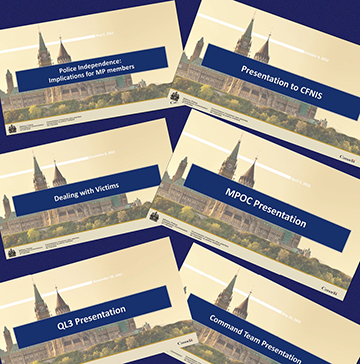
The MPCC's outreach program is key to building relationships with the Military Police, the community they serve, the complainants, subjects of the complaint and witnesses involved in the complaint process, the Canadian Armed Forces at large as well as other key stakeholders. In 2022, the MPCC continued its virtual outreach program and tried new ways of delivering outreach by leveraging technology. The MPCC greatly appreciates the efforts of the many individuals who organized, supported, and participated in its outreach activities at the bases and the Canadian Forces Military Police Academy as well as at other events.
i – Canadian Forces National Investigation Service
Once again this year, the MPCC was invited to present at the training session for new Canadian Forces National Investigation Service members. The Senior General Counsel and Director General, Julianne Dunbar, and the General Counsel and Senior Director of Operations, Elsy Chakkalakal, both attended and provided the new members with a very useful discussion on our mandate and the importance of professionalism in the work of Canadian Forces National Investigation Service members.
ii – Office of the Chief of Defence Staff
Interim Chairperson, Bonita Thornton, Senior General Counsel and Director General, Julianne Dunbar, and General Counsel and Senior Director of Operations, Elsy Chakkalakal, provided a virtual session to the Chief of Defence Staff and his staff on Part IV of the National Defence Act complaints process and answered questions regarding procedures and practices.
iii – Australian Royal Commission into Defence and Veteran Suicides
Interim Chairperson, Bonita Thornton, Senior General Counsel and Director General, Julianne Dunbar, and General Counsel and Senior Director of Operations, Elsy Chakkalakal, along with other Department of National Defence Portfolio agencies provided a presentation and briefing to the Australian Royal Commission into Defence and Veteran suicides regarding our work.
iv – Canadian Armed Forces Locations across Canada
Virtual sessions with participants across Canada and beyond increase awareness of the MPCC's mandate and activities, build relationships with stakeholders and provide an opportunity to respond to questions and concerns about the Complaints process. The primary audiences are:
- members of the Military Police who may be subjects, complainants or witnesses in conduct or interference complaints;
- the military chain of command, which relies on the services of members of the Military Police to maintain military discipline, but cannot interfere with police investigations; and
- those who may interact with the Military Police because they live, work, or visit a Canadian Armed Forces base. The MPCC's connection to this group is often made through the executive directors and staff of the Military Family Resource Centres.
The MPCC's goal is to reach as many members of the military family as possible, while respecting the operational realities of Canadian Armed Forces bases and wings across the country and abroad.
Following the success of the virtual national town halls on interference, as well as some other pilot outreach sessions, the MPCC launched a series of national virtual outreach sessions in the Fall of 2021. This continued into 2022. The new program allows members of the primary audience to register to an event at the date and time of their choice. Rather than restrict each session to one base, each session is aimed at a particular audience and offered widely. We delivered 5 sessions to Military Family Resource Centres audiences, 7 to military police audiences, and 5 to Command team members. A total of 291 participants attended virtual outreach sessions throughout the year.
The feedback provided by participants was very positive. Their feedback and our experience will be used to continue to improve the design and delivery of further virtual outreach sessions in the coming year.
v – Canadian Forces Military Police Academy
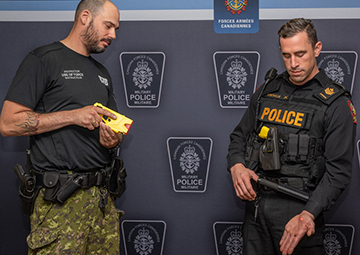
The MPCC delivers regular outreach sessions to the Canadian Forces Military Police Academy located in Borden, Ontario as part of its curriculum. Again this year, the MPCC presented virtually to the graduating Qualifying Level 3 classes in the spring and the fall. We appreciated the opportunity to remind 94 new Military Police members of the importance of police oversight. The MPCC also delivered outreach sessions to Military Police Officers Course classes in the spring. Twenty police members attended these Military Police Officers Course outreach sessions.
vi – Canadian Association for Civilian Oversight of Law Enforcement (CACOLE)
The Canadian Association for Civilian Oversight of Law Enforcement (CACOLE) is a national, nonprofit organization of individuals and agencies dedicated to advancing the concept, principles and application of civilian oversight of law enforcement organizations across Canada and abroad. CACOLE is recognized worldwide for its policing oversight leadership. The MPCC's Chairperson is a member of the CACOLE Board of Directors.
CACOLE held its annual educational conference in 2022 ("The Changing Face of Oversight") using a hybrid model for in-person attendance as well as attendance via videoconference and was attended virtually by the Interim Chairperson and several members of the MPCC.
VII – Collaboration
Throughout the year, the MPCC continued to work towards resolution of a number of complex and challenging matters with the National Defence leadership, the Canadian Forces Provost Marshal, the military chain of command and the military police community. This work is undertaken with a view to making the complaints process more efficient and effective. Notably, after the release of the Report of the Third Independent Review Authority to the Minister of National Defence, the MPCC has taken part in Working Group meetings with Canadian Armed Forces and Department of National Defence officials at both the Chairperson and working levels to ensure the implementation of the recommendations contained in this Report.
i – Canadian Forces Provost Marshal
The MPCC Interim Chairperson and the Canadian Forces Provost Marshal continued the practice of having annual meetings to discuss matters of mutual interest, including their core mandates and objectives.
This year, the meeting took place on November 25, 2022. These meetings provide an opportunity for the MPCC Interim Chairperson, the Canadian Forces Provost Marshal, along with their respective key staff to discuss issues with respect to the complaints process and to find ways to improve the process. These meetings have been fruitful in ensuring strong lines of communication and a collaborative relationship. This has been reinforced by regular meetings between the MPCC Senior General Counsel and Director General and the Deputy Commander of the Canadian Forces Military Police Group / Office of Professional Standards of the Canadian Forces Provost Marshal. MPCC personnel have also engaged as needed with Professional Standards staff to maintain a professional and collaborative relationship to address issues as they arise.

Part 3 – Excellence in Management and Leadership
I – Financial Management
In 2022, the MPCC continued to demonstrate sound management of its financial resources. It effectively planned, managed and controlled its budget and expenditures to meet operational needs and increased central agency requirements, including timely and accurate financial reporting. In 2020, an Internal Control over Financial Management Framework was approved by the MPCC Executive Committee. This framework included a five-year internal control audit plan. The results of the Year 1 audit were tabled at the MPCC Executive Committee in the summer of 2022. The MPCC also carried out the assessment of the design effectiveness and operating effectiveness of its internal controls and put in place adequate management action plans to address the opportunities for improvement identified.

Operating Budget: The current annual budget for the MPCC is $4.4 million. It is used to support the MPCC's legislative mandate under Part IV of the National Defence Act. This includes the investigation and resolution of complaints and all other activities necessary to meet central agency requirements, including the production of the various accountability reports required by these agencies and by Parliament (departmental plans, departmental results reports, annual reports, annual financial statements and quarterly financial reports). In addition, the MPCC receives additional funding during the year from its operating budget carryforward and compensation allocations related to the renewal of collective agreements.
Additional Financial Information: Additional financial information about the MPCC's financial and expenditure management may be found in the Reports and Transparency sections of the MPCC's website under Departmental Plans, Departmental Results Reports, Quarterly Financial Reports, Annual Financial Statements and Proactive Disclosures.
II – Hybrid Model
This past year, the MPCC adopted a hybrid model where employees are working using a combination of telework and in-office presence. This change required great participation, agility, and flexibility from all employees. Most MPCC offices were depersonalized in order to allow for an unassigned seating and activity-based environment whereby the workspace is designed to perform different activities over the course of the workday such as learning, focusing, and collaborating. The Information Technology team implemented all the technology changes and the new workstations quickly and provided great tips to ease any challenges employees may face when first attending the office with the new set-up. In 2022, work was done to implement a more userfriendly booking system for the MPCC. In addition, Corporate Services Branch had reviewed and updated many internal policies and directives to align them with the implemented Hybrid Model. The MPCC continues to collaborate with central agencies in the Government of Canada future of work initiative.
During this change, senior management engaged employees on their priorities and their concerns in a three-part formal engagement session with an external consultant guiding the discussions as a neutral facilitator. The Executive team has already addressed some of the concerns or recommendations that were highlighted during the session and continues to engage employees during frequent all-staff meetings to keep the conversation ongoing as we move forward.
III – Digital Transformation for the Future of Work
Prior to the beginning of the pandemic, the MPCC had launched an Information Technology transformation project to implement Microsoft 365. This allowed the Information Technology team to accelerate the implementation of Microsoft TEAMS throughout the organization. We also maintained extra Information Technology support over the adoption period in order to better support employees in a virtual environment.
The priority this year was to replace aging Information Technology network equipment and be set for success in the Hybrid Model. In addition, the modern management tools of Microsoft 365 continue to be utilized to manage and secure the network environment and the Information Technology devices. The security posture continues to improve and the collaboration tools such as Microsoft TEAMS continues to provide proper and efficient communication throughout the organization.

IV – Mental Health and Well-Being at work
The MPCC continued offering a variety of services to employees through an agreement with the Health Canada Employee Assistance Services to provide Informal Conflict Management Services including an Ombudsperson Service and an Employee Assistance Program.
The MPCC's Mental Wellness Champion, the Senior General Counsel and Director General, and the Mental Wellness Committee continued to foster awareness among employees about mental health and well being by offering a half-day session with an external moderator on the topic of "Wellness and Well-Being in times of change and work-life balance." The Mental Wellness Committee also developed and implemented several ideas to support the Well-Being of its employees such as introducing a Gratitude Board and Spreading Positivity session at All Staff Meetings, posting wellness messages on the TEAMS platform, and introducing a monthly Well-Being and health coffee chat. The Mental Wellness Committee also organized a giving back program during the holiday season where employees voluntarily contributed to the Big Brothers and Big Sisters Holiday Hamper Program.
The MPCC also continued to publish information on mental health and wellness through providing resource information and acknowledging events such as Mental Health Week and World Mental Health Day. A selection of videos about mental health were presented at bi-weekly all-staff meetings and the LifeSpeak campaign, which provides mobile access at all times in a confidential, bilingual electronic learning platform for employees and their families, was promoted. Finally, the MPCC implemented a new external harassment policy that provides its employees with tools to deal with unreasonable interested party behaviour. The MPCC implemented this policy to foster a safe and healthy workplace for its personnel.

V – Diversity and Inclusion
Again this year, the challenges created by the pandemic and working remotely did not diminish our commitment and achievements to develop a diverse, accessible, agile and inclusive work environment where everyone feels supported, motivated and respected. Despite working largely remotely, the MPCC continued to create an accessible work environment by addressing barriers and proactively addressing accommodation requirements to allow for the full participation of its employees in their work environment.
Similar to last year, the MPCC has supported weekly virtual coffee breaks that have been in place since the beginning of the pandemic, which helped maintain healthy relationships and a collegial culture in the workplace. These virtual coffee breaks allow for the exchange of information, the reduction of feelings of isolation and the facilitation of informal onboarding of new employees. The MPCC Social Committee planned virtual and in-person activities to maintain this social cohesion. Pumpkin Carving Competition, a visit to the Canadian War Museum during National Public Service Week and an in-person activity during the Holiday Season are only a few examples of the Social Committee's initiatives.
Events and awareness days/months were promoted through various communication channels and virtual lunch and learn events. These included Asian Heritage Month, National Aboriginal History Month, Gender Equality Week, Pride Month, Public Service Pride Week, Canadian Multiculturalism Day, International Day of Persons with Disability, National Accessibility Week and Orange Shirt Day.
We continue to pride ourselves on the level of diversity at the MPCC with 28% of employees having self-identified as visible minorities and 20% have self-identified as persons with disabilities; this far exceeds the expected percentages based on workforce availability which is the benchmark used by the Treasury Board Secretariat.
In the Fall of 2022, Treasury Board Secretariat launched its Self-Identification Modernization Project. The modernization tackles how public servants self-identify. The new form includes a section for LGBTQ2+ (Lesbian, Gay, Bisexual, Transgender, Queer, Two-Spirits, Plus) selfidentification, as well as a more contemporary and inclusive terminology designed to enhance the understanding of intersectionality. The MPCC looks forward to supporting this innovative project to see where gaps reside, improving understanding of our workforce and taking the required actions to develop, train or improve our hiring practices to support a diversified and inclusive workforce
VI – Spotlight on Human Resources
The MPCC continues to build its capacity across the organization and support their managers and employees in every aspect of People management. Through service level agreements with the Canada School of Public Service, our employees have ease of access to a broad range of workshops or learning opportunities to enhance their knowledge or competencies.
The MPCC has been working steadily to improve the way we work, including developing an action plan to implement measures set out in the Clerk of the Privy Council's Call to Action on Anti-Racism, Equity and Inclusion in the Federal Public Service.
The MPCC remains committed to advancing accessibility and creating a barrier-free workplace for its employees and barrier-free services for all Canadians and those we serve. One of the key principles of the Accessible Canada Act is "Nothing Without Us" which means that persons with disabilities should be consulted when developing laws, policies and programs that impact them. In keeping with this principle, the MPCC has undertaken consultation with its employees and Canadians with the goal of improving our services, communications, and systems by making them more accessible to people with disabilities. We look forward to publicly sharing our accommodation plans in the months to come.



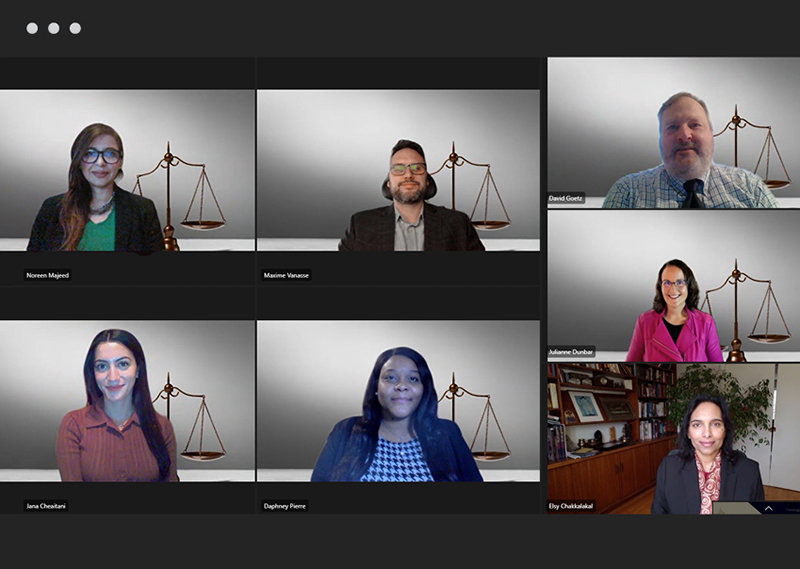
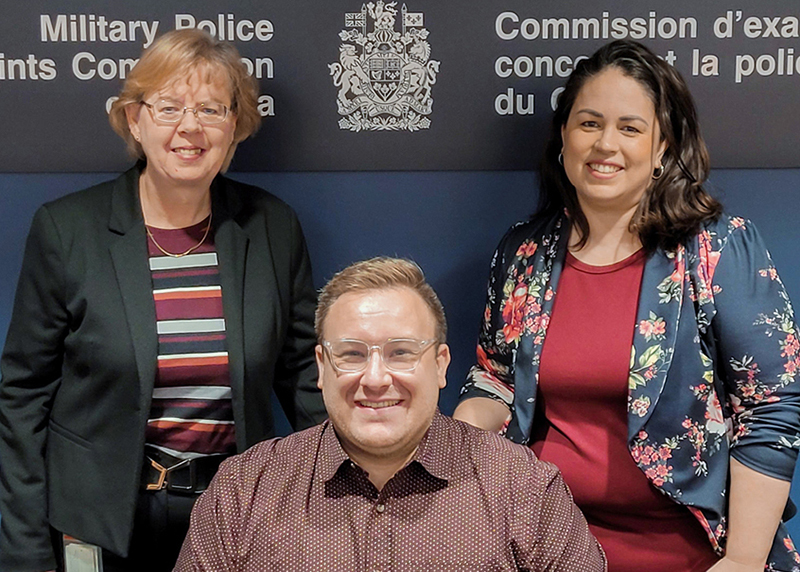
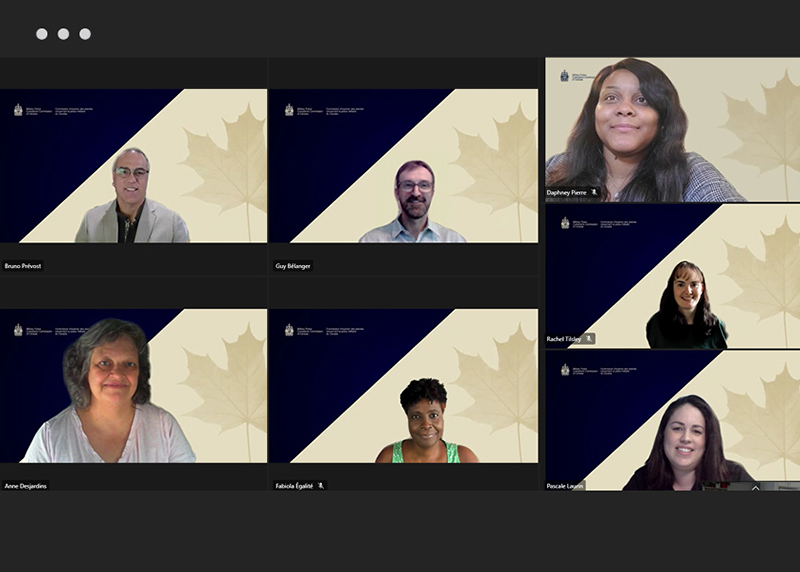
Part 4 – Conclusion
I ‐ Interim Chairperson's Conclusion
It is most fitting that the charting of this new era in military policing oversight includes the appointment of a new MPCC Chairperson. We at the MPCC are delighted to welcome someone of Me Tammy Tremblay's skills and experience to lead the MPCC through these critical times of transition and renewal.
For myself, I am pleased to have been of service to the MPCC and its mission as Interim Chairperson since October 2021. It has been an honour to be a part of such a dedicated and friendly team. I look forward to continuing with the MPCC team as a Commission Member, and to working with the new Chairperson.
This past year has been an exciting period imbued, as it has been, with the prospect of reform and the opportunity for improvement, not least in the area of military policing and Military Police oversight.
The recommendations of the Third Independent Review have given hope for important enhancements in the MPCC's ability to provide effective, efficient, and credible oversight of military policing. Some of the proposed reforms had been sought by the MPCC for many years. In particular, the MPCC has noted that to properly support public accountability of, and public confidence in, the Military Police, the MPCC must have, and be seen to have, robust access to information relevant to the cases before it.
While initial discussions on the implementation of the Independent Review recommendations with Department of National Defence stakeholders were positive, a major preoccupation for the Commission in 2023 will be to ensure that key reforms proposed by the Independent Review Authority, and accepted in spirit by the Government, are implemented in a manner that is timely and consistent with their intent.
As we continue to discharge our mandate, the MPCC looks forward to continuing its positive and productive collaboration with the Canadian Forces Provost Marshal and his team. This relationship has been of the utmost importance to us in our work, and will continue to be so, as we chart this new era of Military Police oversight.
Original signed by
_____________________________
Bonita Thornton, B.A., LL.B., CD
Interim Chairperson
II – Our Organization
i – Biography of the Interim Chairperson
Bonita Thornton
Interim Chairperson / Commission Member

(March 2018 – present)
Me Bonita Thornton was appointed as a Commission Member in March 2018 and assumed the role of Interim Chairperson from October 5, 2021, to January 2, 2023.
Me Thornton is a lawyer, adjudicator, manager and military veteran with extensive government and regulatory experience in administrative and criminal law. She is also a Board Member with the Health Professions Appeal and Review Board. Me Thornton previously led the Investigations Department at the Law Society of Ontario and the College of Physiotherapists of Ontario.
Me Thornton worked for twelve years as a lawyer and officer with the Office of the Judge Advocate General, Canadian Armed Forces (retired rank of Commander). From 2006 until 2012, she held the position of Assistant Judge Advocate General, Central Region, where she oversaw five legal offices across Ontario and provided advice and training to military commanders, police and personnel on a broad spectrum of legal and operational issues. She was deployed to Afghanistan in 2008‑2009 as the senior legal advisor to the Canadian Task Force in Kandahar.
Me Thornton has lived and worked across Canada. She graduated from Queen's Law School in 1997 and was called to the Ontario Bar in 1999. Me Thornton has received the Queen Elizabeth II Golden Jubilee Medal, Queen Elizabeth II Diamond Jubilee Medal and 125th Anniversary of the Confederation of Canada Medal for her contributions to Canada and her community.
ii – Biographies of the Commission Members
Ron Kuban, Ph.D.
Commission Member

(May 2018 – present)
Dr. Kuban was appointed as a Commission Member in May 2018 and was renewed in 2022.
A graduate of the Royal Military College in Kingston, Ontario, he completed his M.Ed. and Ph.D. at the University of Alberta. For the last 51 years, he has been employed in the public sector of Canada and Alberta, and in his consulting company regarding emergency/crisis management.
Dr. Kuban has held numerous senior positions of responsibility, both paid and voluntary. The former includes service as a Commissioned Officer in the Canadian Armed Forces, a Commissioner on the Edmonton Police Commission, a Member of the Parole Board of Canada and until recently as a Member of the Alberta Social Services Appeals Board.
Dr. Kuban volunteered for 35 years on numerous Boards at the local, provincial and national level, and was recognized for his service. Aside from his military medals, he was awarded the Queen's Golden and Diamond Jubilee medals, as well as the Alberta Centennial Medal.
Leslie-Anne Wood
Commission Member

(July 2021 – October 2022)
Leslie‑Anne Wood served as a Commission Member from July 2021 to October 2022.
Leslie‑Anne is a lawyer, trained in environmental science (B.Sc. 2004) and common law at the University of Ottawa (J.D. 2008), and in civil law at the University of Montreal (LL.B. 2008). She also obtained a Master of Laws degree from Yale Law School (LL.M. 2010).
Called to the Quebec Bar in 2009, Leslie‑Anne has worked in the private and public sectors, in Canada and internationally. Notably, she was a law clerk to the Honourable Marie Deschamps at the Supreme Court of Canada, where she later also acted as legal counsel. Ms. Wood practiced litigation with IMK LLP in Montreal, has taught as a lecturer at McGill University's Faculty of Law and has completed public interest internships with the Orleans Public Defenders in New Orleans and the South African History Archive in Johannesburg.
Leslie‑Anne grew up in Gatineau. In recent years, she has volunteered at the Society for the Prevention of Cruelty to Animals as a dog walker and at the Ottawa Hospital in inpatient care.
Mark Ferdinand
Commission Member

(October 2021 – present)
Mark Ferdinand was appointed as a Commission Member in July 2021.
Between 1999 and 2020, Mark worked as a public policy specialist and executive in the public, not-for-profit and private sectors.
An avid volunteer for over 30 years, Mark has served as an expert advisor to several organizations on a range of issues, including innovation policy, population health, mental health policy, graduate education, and prescription drug misuse. He served as Chairperson of the Board of Directors of the National Initiative for Eating Disorders from 2019 and 2021.
Mark holds a Bachelor of Laws degree from the Université de Montréal and earned a Bachelor of Arts (First Class Honours) in Italian from McGill University.
iii – Organization chart
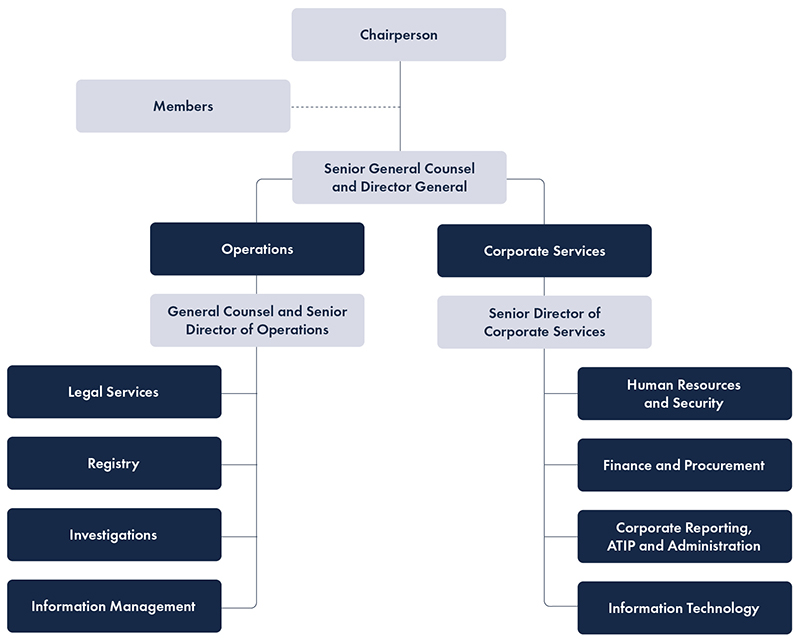
Alternate format
The image illustrates the Military Policy Complaints Commission of Canada's (MPCC) organizational structure, last updated in September 2016.
The chart is described from top to bottom starting with the highest position, being that of the Chairperson.
The Chairperson is linked to the Members, the General Counsel and Senior Director General of Operations and the Senior Director of Corporate Services.
The General Counsel and Senior Director General of Operations manages
- Legal Services
- Registry
- Investigators
- Information Management
The Senior Director of Corporate Services manages
- Human Resources
- Finance
- Administration
- Information Technology
How to Reach the Military Police Complaints Commission of Canada
Call our information line
613‑947‑5625 or toll-free at 1‑800‑632‑0566
Send us a letter
Military Police Complaints Commission of Canada
270 Albert Street, 10th floor,
Ottawa, ON K1P 5G8
Contact us for a private consultation.
Send us an email
Note: We cannot guarantee the security of electronic communications.
Visit our website
Follow us on Twitter
Follow us on LinkedIn
Like us on Facebook
- Date modified:

